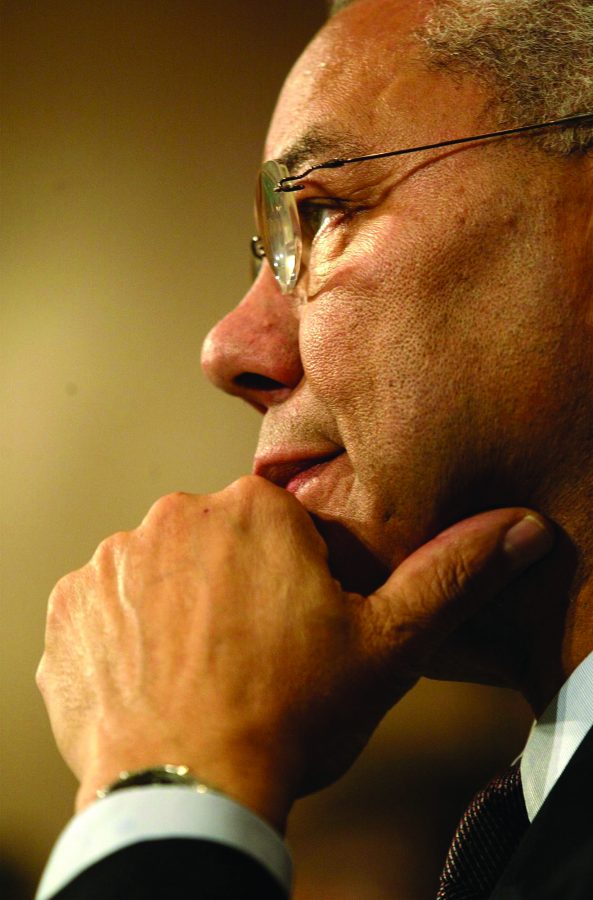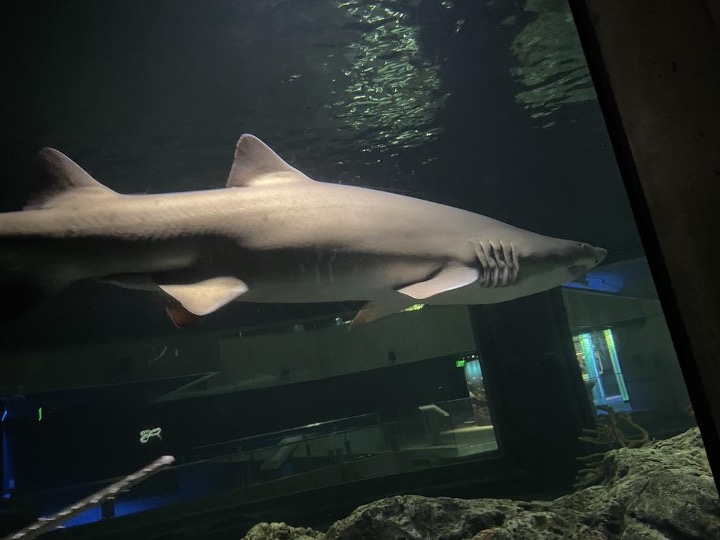With power comes great responsibility; also with that power comes the expectation of criticism. General Colin Powell, who will give the second Hanway Lecture in Global Studies on Tuesday, October 22, has faced much criticism over his tenure as a political and military figure. Similarly, the announcement of Powell as the next Hanway speaker has brought analysis from different corners of the Loyola community.
Though Powell will be answering questions that were submitted prior to the event, he will likely present a longer, formal lecture, unlike previous Hanway speaker former Prime Minister Tony Blair; the details of what Powell will speak about are still unclear. He is known for his leadership qualities, beginning from his time in the military up through his time working in the White House under Reagan, George H.W. Bush, Clinton and George W. Bush, under whom he served as secretary of state. So, it may not be far-fetched to assume a focus of his speech could be leadership.
Dr. Dennis McCornac, interim director of global studies and associate professor of economics, said, “When you look at everything he did, he is the epitome of a leader, and I think what [Powell] is going to talk about is what are the requirements for a good leader…I think that’s what [students] can take away and they’re looking at somebody who has held many important positions in both the military and the government, and they can look at that and say ‘He certainly has some lessons [to learn from].’”
On the other hand, there is some concern with having a formulaic lecture as a featured event in the Hanway series. Dr. Catriona Hanley, associate professor of philosophy, said, “There will be no surprises at Powell’s talk: he will be paid an awful lot of money to say in person the same words that we could easily find him saying on YouTube.” She emphasized the importance of bringing speakers with unique messages for Loyola students. Hanley continued, “[Powell] will not have crafted a special speech directed to Loyola students, but will simply pull a canned speech from out of his repertoire and deliver it.”
As a global studies lecture, the Hanway series, according to its website, aims to “foster global awareness on campus” by inviting speakers who will “share timely, relevant insight into today’s global society.” With former Prime Minister Tony Blair giving the inaugural lecture last spring, the international aspect was certainly present, and Powell will bring an extensive knowledge of the military and government. However, some people argue that having Powell and Blair in such close succession does not provide a wide enough perspective of global policy.
“The visit is…controversial because it seems to repeat the theme of last year’s speaker—a high official representing Anglo-American global power. Voices on campus suggest that this is not a good representation of the global studies program,” Hanley said of Powell’s impending visit. “It would surely be more enlightening for students and faculty to hear voices from around the globe that are otherwise not on our mental or physical screen.”
Danielle Porfido, a member of the class of 2014 and of the Peace and Justice Studies Initiative leadership committee, said, “I think that it is a shame that we could not bring more diversity to campus in terms of time period and world events that shaped both Blair and Powell’s careers.” Porfido explained that both Blair and Powell were heavily involved in the Iraq war, a subject that many current college students may not be fully educated on because it unfolded when they were younger. She continued, “They are both obviously two different personalities with different career paths, but it cannot be denied that they were on the same side, supporting the same war.”
Hanley echoed Porfido’s recognition of college students’ lack of knowledge about the details of the Iraq war and other conflicts at the time, explaining how they were between the ages of four and eight at the time and were obviously not politically informed, adding that some students still think Saddam Hussein was responsible for 9/11 and involved with Al-Qaeda.
“Many of my students are interested in reaching political maturity, that is, in becoming familiar enough with the dynamics of global politics that they can form their own views on political matters. To get there requires a lot of background, however,” said Hanley. “It requires some knowledge of history and contemporary world affairs of course, but essential also is historical understanding: one must have some understanding of how to think critically about history, about the political structure, about the media. I think that a lot of students here are lacking in those skills, even though many thirst for it.”
In the context of Powell, his past actions and being educated on those actions, Loyola students have to understand what decisions were made, especially during the Iraq war, and how they conflict with the Jesuit values that are so intrinsic to the University. Matthew DiFerdinando, a member of the class of 2014 and of the Peace and Justice Studies Initiative leadership committee, said, “Loyola’s Jesuit values certainly do not condone Powell’s perspective at that time and condone even less the violent, aggressive, unfounded actions that our soldiers were ordered to carry out in Iraq as a result of endorsements such as Powell’s.”
McCornac acknowledged the controversy that could arise from having Powell speak, but he said it presents the opportunity for a greater dialogue. “If anything, it’ll hopefully get more people to wonder why there’s reactions from both sides. I know that when I talked to a number of students in global studies, most of them really were not aware of Colin Powell—they knew who he was—but they weren’t aware in terms of his going in front of the UN or what he had done in the past,” he said. “So in that sense, I think this way it will get people to have a dialogue, and they’ll get to know different points.”
DiFerdinando said, “Ignoring the other side and views different from our own is what causes so many conflicts to begin.”
“I think for students, it will be a good experience to see somebody of that caliber and somebody who really knows the inner-workings of the government and also the military. And again, it’ll at least get people talking,” said McCornac.

















































































































Sean Sanders • Oct 16, 2013 at 3:40 am
Well, I see that The Greyhound hasn’t improved since I left… We are still arrogantly passing off persuasive essays as pieces of objective journalism.
How about we hear from somebody defending Mr. Powell from an off-point, blanket claim that “Loyola’s Jesuit values certainly do not condone….violent, aggressive, unfounded actions that our soldiers were ordered to carry out in Iraq as a result of endorsements such as Powell’s.”
Really, Loyola? Is this student speaking for you and the entire Jesuit order?
Why don’t we give the man a chance to speak before unjustly criticizing him? Mr. DiFerdinando understands my point, for he said (quite ironically): “Ignoring the other side and views different from our own is what causes so many conflicts to begin.”
You can do better, Greyhound.